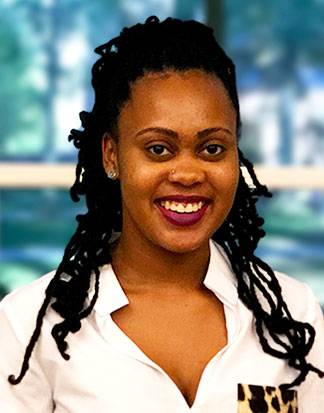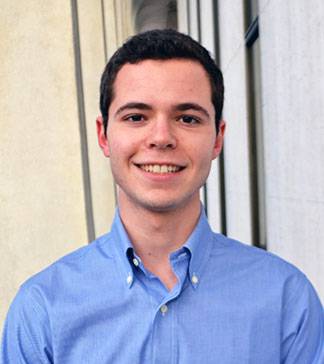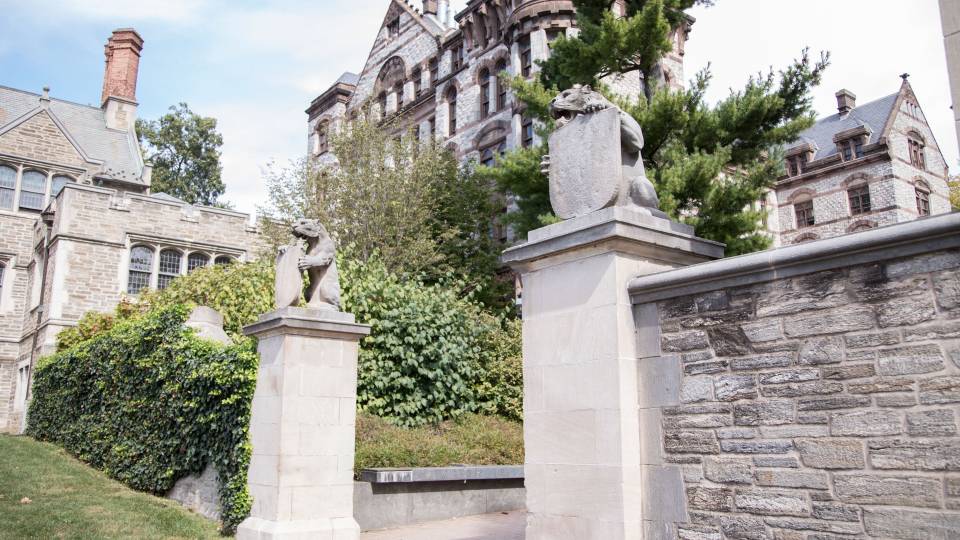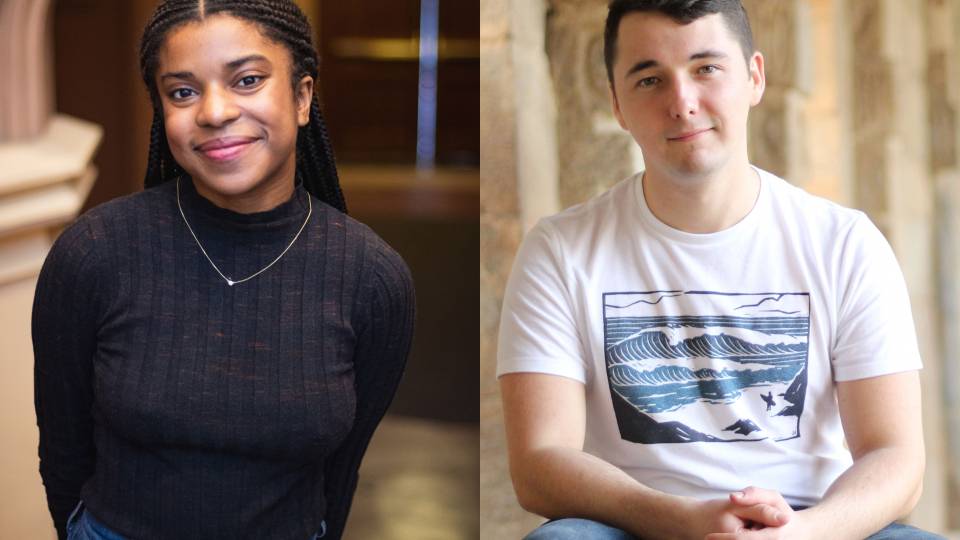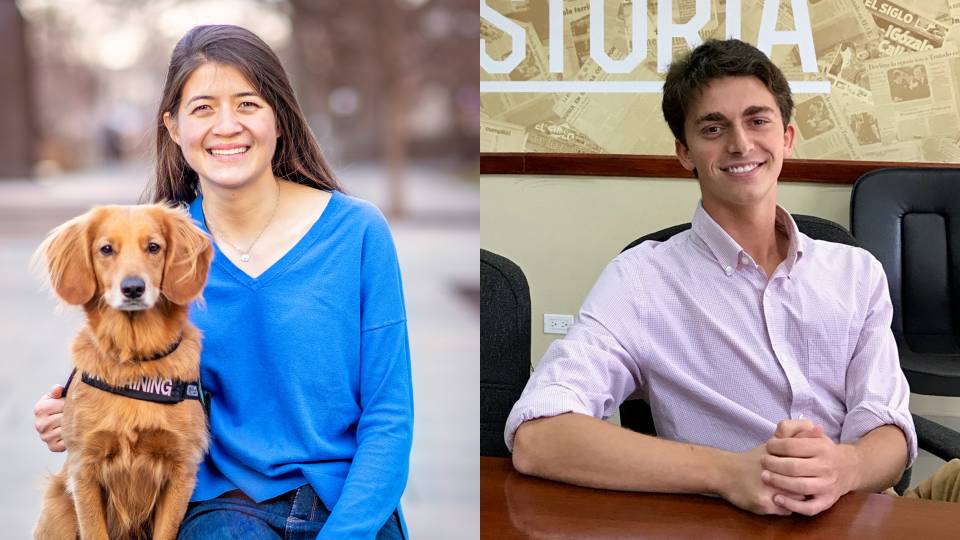Princeton University seniors Destiny Crockett and Nicolas Trad have been awarded fellowships from ReachOut 56-81-06, an alumni-funded effort that supports year-long public service projects after graduation. Each senior will receive a stipend of $30,000 to pay for living expenses during their fellowship year.
Crockett will use her fellowship to partner with Girls for Gender Equity NYC to design and execute a Black Feminist Reading Series for middle and high school girls in predominantly black, low-income schools with high rates of suspensions and school arrests.
Trad will use his fellowship to implement a mobile technology platform designed to address medication shortages in 10 clinics surrounding Zithulele Hospital in the Eastern Cape province of South Africa.
ReachOut 56-81-06 is an effort by members of the Princeton Classes of 1956, 1981 and 2006 to underwrite valuable public service projects, with special weight given to those of social significance that are innovative, creative, entrepreneurial or a combination thereof.
Each year, ReachOut awards one fellowship for a domestic project and one for an international project. The latter can be performed anywhere in the world, including the United States. The international fellowship is funded through a donation by a Class of 1956 alumnus. Two holders of ReachOut 56-81-06 grants are currently serving in New York City and Washington, D.C.
"We are pleased once again, for the 17th consecutive year, to provide fellowships for a year to outstanding graduating Princeton students who take the less traveled path out of the university: they design their own innovative and socially impactful year-long projects," said Jon Wonnell and Marty Johnson, co-chairs of ReachOut 56-81-06. "The 2017 recipients — two outstanding seniors with extraordinary backgrounds — have developed projects that epitomize our goals: to bring unique solutions to societal challenges, in the tradition of 'Princeton in the nation's service and the service of humanity.'"
Crockett, from St. Louis, is an English major. She is also earning certificates in African American studies and gender and sexuality studies.
Crockett's Black Feminist Reading Series will take place at Urban Leaders Academy, which is the Girls for Gender Equity's after-school program in Brooklyn, New York. Her aim is to work with the girls' on their reading and critical thinking skills, and to improve their sense of belonging and self-confidence. Her broader mission is to further the conversation around black girls' complexity, and to ask questions about what influences how they think of themselves.
At Princeton, Crockett served as the president of Students for Education Reform; organized The Womanist Mystique, a national academic symposium on Black women writers and activists; served as a member of the Council of Princeton University's Community Task Force on Equity and Diversity; and served as a member of the Undergraduate Advisory Boards of African American studies and the Department of English. She was a fellow at the Schomburg Mellon Humanities Institute, worked as an elementary school tutor through Princeton Young Achievers and interned at the Carl A. Fields Center for Equality and Understanding.
"I am excited to be a ReachOut fellow and I look forward to working with Girls for Gender Equity, an organization that has done an excellent job of engaging black and brown students in culturally relevant pedagogy and social justice initiatives," said Crockett. "Through poetry, essays, short stories and op-eds written by black women, we will discuss topics such as street harassment and sexual violence, reproductive justice, beauty standards and norms, gentrification and other relevant issues. I am truly grateful to ReachOut for the opportunity to pursue this project."
After completing her fellowship, Crockett will pursue graduate study at the University of Pennsylvania.
Trad, from Bethesda, Maryland, is a major in the Woodrow Wilson School of Public and International Affairs and is earning a certificate in global health and health policy.
Through the ReachOut fellowship, Trad will work to ensure continuous access to essential medications in 10 clinics in South Africa. He hopes to implement a technology platform that will not only address current medication shortages, but also ensure that his intervention can remain sustainable in the long term and become a model for tackling medication distribution problems that are pervasive in the South African health care system.
At Princeton, Trad was awarded the University's Shapiro Prize for Academic Excellence, received Phi Beta Kappa honors, served as the student representative to the University for the Program in Global Health and Health Policy and volunteered at a local rehabilitation center. He worked as a research intern for Children's National Medical Center in Washington D.C.; as a Global Health Fellow for Unite for Sight, which brings glasses and sight-restoring surgery to rural Hondurans; and as an intern for the International Commission for Missing Persons in Sarajevo, Bosnia.
"During my fellowship, I will work with doctors, hospital administrators and nurses in Zithulele to mitigate chronic shortages of antibiotics, antiretrovirals, basic pain relievers and other essential medications," said Trad. "By empowering nurses in remote clinics with tools to track the stock and flow of medications, this project will allow suppliers to better predict the need for new drugs in individual clinics. Through the innovative use of simple mobile technologies, I hope to tackle a preventable problem that hampers basic treatments and depletes the reservoir of trust between patients and their care providers. Zithulele Hospital, recognized in South Africa as a model of excellence in rural health, has shown that progress is achievable with practical policies, motivated leadership and inventive uses of limited resources."
After completing his fellowship, Trad plans to attend medical school.
